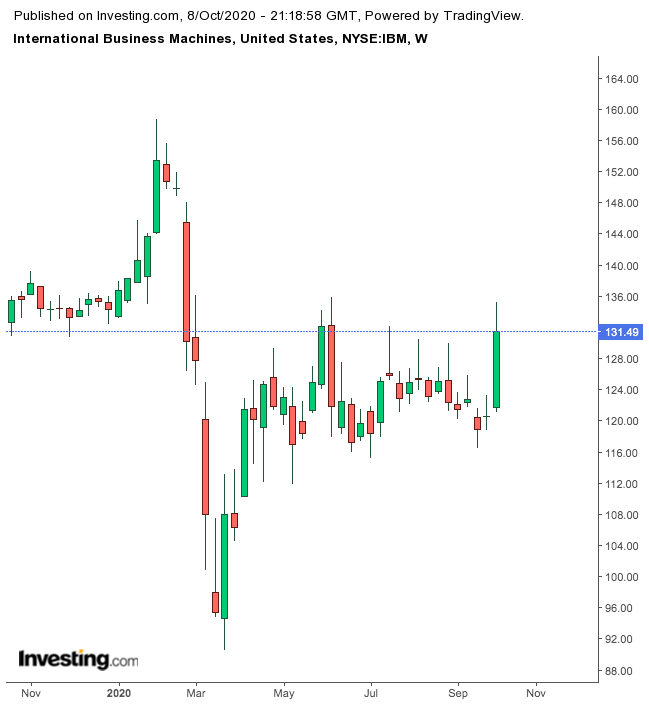The past decade was a lost one for International Business Machines (NYSE:IBM). The software and services giant remained irrelevant in the fast-changing technology world, failing to innovate itself and losing ground to new entrants.
During Virginia Rometty’s eight years at the helm, IBM proved to be dead money for investors. This was the decade when Amazon (NASDAQ:AMZN), Microsoft (NASDAQ:MSFT) and Netflix (NASDAQ:NFLX) all rallied as demand soared for computing power and applications.
IBM’s stock dropped 24% under Rometty’s leadership, the only U.S. tech company currently valued at $100 billion or more to lose value in that period. Shares of the other 16 most valuable tech companies gained anywhere from 64% (Qualcomm (NASDAQ:QCOM)) to 3,468% (Netflix).
But since her departure early this year, there are signs that Big Blue, as it's sometimes referred to colloquially, is gaining lost ground. IBM's new management structure has brightened prospects for the company’s long-term growth after many years of declining sales.
Arvind Krishna, who headed the company’s cloud and cognitive-software division, is now the CEO. Jim Whitehurst, who was chief executive of Red Hat, the open-source software giant that IBM acquired for about $34 billion last year, was appointed the company’s president.
IBM stock closed up 7.4% on Thursday after the company announced that it would spin off its managed infrastructure services unit, currently part of its global technology services division, into a new public company, as part of its hybrid cloud strategy.
Shares of this legacy tech giant, which dominated computing's early decades with inventions like the mainframe and later the floppy disk, traded at $131.49 at yesterday’s close, almost unchanged for the year.

Betting On Hybrid Cloud Growth
The latest move will help concentrate IBM's focus on hybrid cloud, which has been driving group earnings in recent quarters.
In a statement, this is what Krishna said:
"IBM is laser-focused on the $1-trillion hybrid cloud opportunity. Client buying needs for application and infrastructure services are diverging, while adoption of our hybrid cloud platform is accelerating."
"Now is the right time to create two market-leading companies focused on what they do best. IBM will focus on its open hybrid cloud platform and AI capabilities. NewCo will have greater agility to design, run and modernize the infrastructure of the world's most important organizations.”
Before the latest move, IBM had begun to benefit from its Red Had acquisition. In the last quarterly report in July, IBM beat analysts’ estimates for second-quarter revenue, with cloud sales helping offset coronavirus-fuelled declines in the consulting services business.
Cloud revenue for the company, based in Armonk, N.Y., rose 30%, helping offset revenue declines in the tech support units Global Business Services and Global Technology Services.
No doubt, these developments are encouraging and could unlock the value of IBM stock. But we remain cautiously optimistic on the company’s turnaround as it faces a very tough competitive environment in the cloud-computing market where Microsoft and Amazon have already taken a significant lead.
Getting this right is critical for IBM at a time when its big clients are shunning IBM hardware and storing their data on cloud services provided by rivals. IBM is currently the fifth largest public cloud infrastructure provider, according to research firm Gartner, with less than 2% market share.
Bottom Line
When it comes to growth, during the past decade, IBM has certainly disappointed its investors. But after the Red Hat acquisition, and with new management in place, we see IBM slowly getting back to a growth path. IBM’s healthy balance-sheet, manageable debt and more than 5% dividend yield make its stock a bet worth considering, especially when its turnaround is gaining pace.
